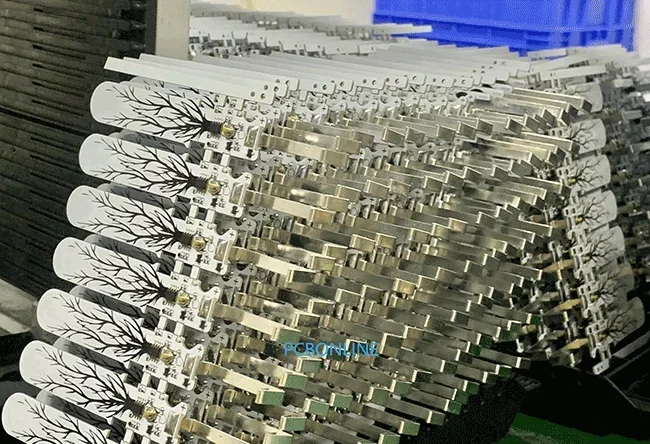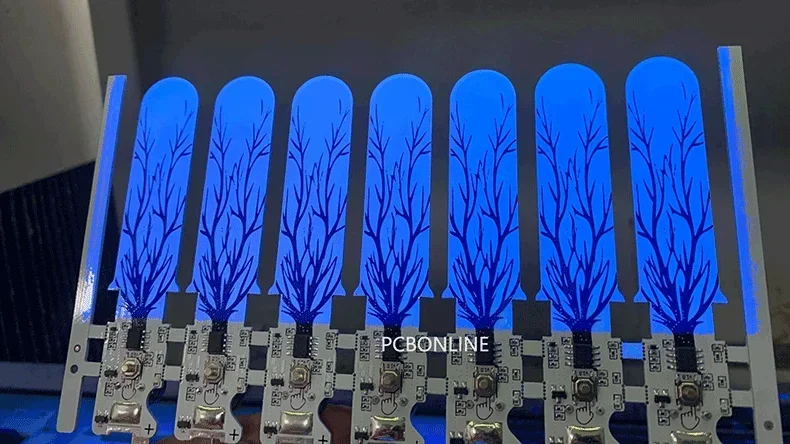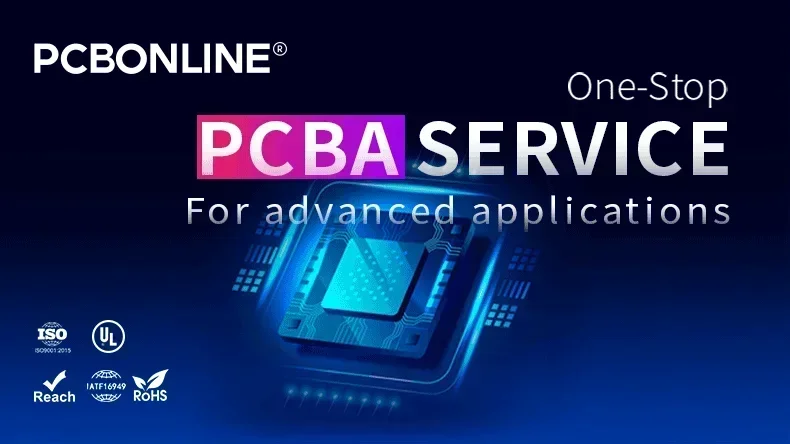
Looking for turnkey PCB fabrication and assembly, including conformal coating. Acrylic, polyurethane, or silicone? Other details (Gerber, BOM, PCB requirements) are included in the .zip.
One client sent this request to us and asked which conformal coating to use on his PCB assemblies. It depends on the application requirements and environments. The conformal coatings, including acrylic, urethane, silicone, parylene, and epoxy (rarely used), have different resistances against UV, salt spray, moisture, chemicals, and vibrations.
PCBONLINE, a turnkey PCBA manufacturer including PCBA coating, will answer what type of conformal coatings to use by comparing their different resistances against different environments.
Part 1 . PCBA Coating: Acrylic, Urethane, Silicone Against Harsh Environments
First of all, let's understand what PCBA coating is.
Printed Circuit Board Assemblies (PCBAs) are the heart of modern electronics, but their reliability depends on how well they withstand environmental challenges such as moisture, dust, chemicals, vibration, and temperature fluctuations. One of the most effective ways to protect PCBAs is by applying a conformal coating — a thin protective film that conforms to the PCB's contours and safeguards it from external damage.
A conformal coating is a polymer-based film applied to a PCBA surface to shield components from environmental factors without affecting electrical performance. The coating is only 25–250 microns (usually 50-75microns) thick but makes a huge difference in reliability.

Among various coating types, acrylic and urethane coatings are widely used for balancing cost, performance, and application flexibility.
Common Conformal Coating Types
1. Acrylic (AR)
Transparent, quick-drying, and easy to apply or remove.
Good moisture and dust resistance, but less suited for long-term water immersion.
Common for consumer electronics and indoor applications.
2. Urethane (Polyurethane, UR)
Strong moisture barrier with good chemical resistance.
Ideal for automotive, industrial, and outdoor electronics.
More difficult to rework compared to acrylic.
3. Silicone (SR)
Excellent temperature resistance (-65°C to +200°C).
Great for high-humidity environments and thermal cycling.
Less chemical resistance than urethane.
4. Parylene (XY)
Applied via vapor deposition for a pinhole-free, ultra-thin coating.
Outstanding moisture, chemical, and dielectric protection.
High cost; best for mission-critical and medical electronics.
5. Epoxy (ER)
Very tough, offers strong water and chemical protection.
Brittle under thermal stress; may crack with temperature swings.
Part 2. PCBA Coating Functions
Conformal coatings serve multiple protective functions for PCBAs: moistureproof, chemical proof, dustproof, vibration proof, and thermal shock and temperature change protection.
1. Moistureproof
Prevents humidity, condensation, or liquid ingress from causing short circuits and corrosion.
Essential for outdoor, marine, and high-humidity environments.
2. Chemical Proof
Protects against corrosive gases, solvents, fuels, and salts.
Crucial in industrial, automotive, and aerospace electronics.
3. Dustproof
Blocks fine dust particles that could cause leakage currents or interference.
Important for electronics in desert or industrial dust-heavy areas.
4. Vibration Proof
Provides mechanical cushioning to reduce solder joint stress.
Extends the lifespan of electronics in automotive, aerospace, and heavy machinery.
5. Thermal Shock and Temperature Change Protection
Maintains PCB integrity during rapid temperature fluctuations.Prevents microcracks in solder joints and component failure.
Part 3. What Application Requirements and Situations Need PCBA Coating?
Not all PCBAs require conformal coating, but in certain environments and product categories, it becomes essential for performance and longevity. You should consider PCBA coating in below environments.
1. Harsh Environmental Exposure
- Outdoor electronics (LED lighting, solar inverters, EV chargers) face rain, humidity, UV, and temperature swings.
- Marine equipment faces salt spray and high humidity, which can accelerate corrosion.
- Mining or desert environments expose PCBAs to dust, sand, and vibration.
2. Industrial and Automotive Use
- Industrial automation systems may be exposed to oils, solvents, and airborne chemicals.
- Automotive electronics endure constant vibration, road salt, and thermal cycling from -40°C to +125°C.
- Agricultural machinery electronics must operate in humid, dusty, and chemical-fertilizer-rich environments.
- Aerospace electronics must operate without failure despite temperature extremes, pressure changes, and vibration.
- Medical devices often require coating to ensure stable operation over the years without maintenance.
- Military electronics may face combined stresses: moisture, vibration, dust, and chemical agents.
- Products designed for 5–10+ years of operation benefit from the additional layer of protection against gradual degradation.
- Helps maintain consistent performance and reduces maintenance costs over the product lifecycle.
- Acrylic: Affordable and easy to work with; good all-rounder for non-extreme environments.
- Polyurethane: Great for moisture and chemical resistance; suitable for harsher environments.
- Silicone: Best for extreme temperatures and vibration-heavy applications.
- Epoxy: Strong and impermeable but rigid; can crack with temperature swings.
- Parylene: Premium option with top-tier protection in all categories.
3. High Reliability or Safety-Critical Applications
4. Long Service Life Expectations
In short, if your PCBAs will encounter moisture, dust, vibration, temperature swings, or corrosive chemicals — or if downtime is simply unacceptable — conformal coating should be part of your manufacturing plan.
Part 4. Comparison Between the Conformal Coating Types
Here's a side-by-side comparison of how each coating type performs in different protective categories:
|
Coating Type
|
Moistureproof
|
Chemical Proof
|
Dustproof
|
Vibration Proof
|
Temperature Shock Proof
|
|
Acrylic
|
★★★☆☆
|
★★☆☆☆
|
★★★★☆
|
★★☆☆☆
|
★★☆☆☆
|
|
Urethane
|
★★★★☆
|
★★★★☆
|
★★★★☆
|
★★★☆☆
|
★★★☆☆
|
|
Silicone
|
★★★★★
|
★★☆☆☆
|
★★★★☆
|
★★★★☆
|
★★★★★
|
|
Parylene
|
★★★★★
|
★★★★★
|
★★★★★
|
★★★★☆
|
★★★★★
|
|
Epoxy
|
★★★★★
|
★★★★★
|
★★★★★
|
★★☆☆☆
|
★★☆☆☆
|
Let's conclude the PCBA conformal coatings here:
Part 5. Partner with Turnkey PCBA Manufacturer PCBONLINE
Selecting the right conformal coating is one part of ensuring your PCBAs survive harsh environments. With 20 years of expertise, advanced manufacturing facilities, and strict quality control, PCBONLINE provides robust and high-quality turnkey PCB assembly, including PCBA coating.

Our two advanced PCB manufacturing bases are in Jiangsu and Jiangxi Provinces, and our turnkey PCB assembly factory is in Shenzhen. Besides, we have an R&D team and a global supply network, with our component supply team centered in Hong Kong.
PCBONLINE offers one-stop turnkey PCBA manufacturing from PCB fabrication and components sourcing to assembly and coating.
Any custom coating options are available – acrylic, urethane, silicone, parylene, or epoxy, applied via spraying, dipping, or selective coating.
We offer industrial-grade quality control – IPC-A-610 certified assembly and strict inspection to ensure coating uniformity and defect-free protection.
We provide one-on-one free and professional DFM before and during prototyping/sampling, helping you select the best coating type for your operating environment, to ensure the manufacturability and project success.
We offer cost-effective mass production with competitive pricing and fast lead times.
Complete equipment and capabilities for turnkey PCBA manufacturing, including PCB fabrication, SMT assembly, PTH assembly, value-added (such as functional test, IC programming, and burn-in test), enclosures, and box-build assembly.
PCBONLINE manufactures, assembles, and tests PCBs and PCBAs to box builds as a source factory manufacturer under one roof, from prototypes to bulky production, saving costs and time for you.
Whether you need consumer electronics PCBAs with quick-dry acrylic coating or ruggedized industrial PCBAs with urethane or silicone, PCBONLINE can handle the full process in-house. To get a quote for turnkey PCB soldering, email us at info@pcbonline.com.
Conclusion
Selecting which conformal coating depends on your PCBA application requirements and environments. Acrylic and urethane conformal coatings remain two of the most popular choices for protecting PCBAs from harsh environments. By partnering with an experienced turnkey PCBA manufacturer like PCBONLINE, you get not only the right coating but also precision application and quality assurance.
PCB assembly at PCBONLINE.pdf




